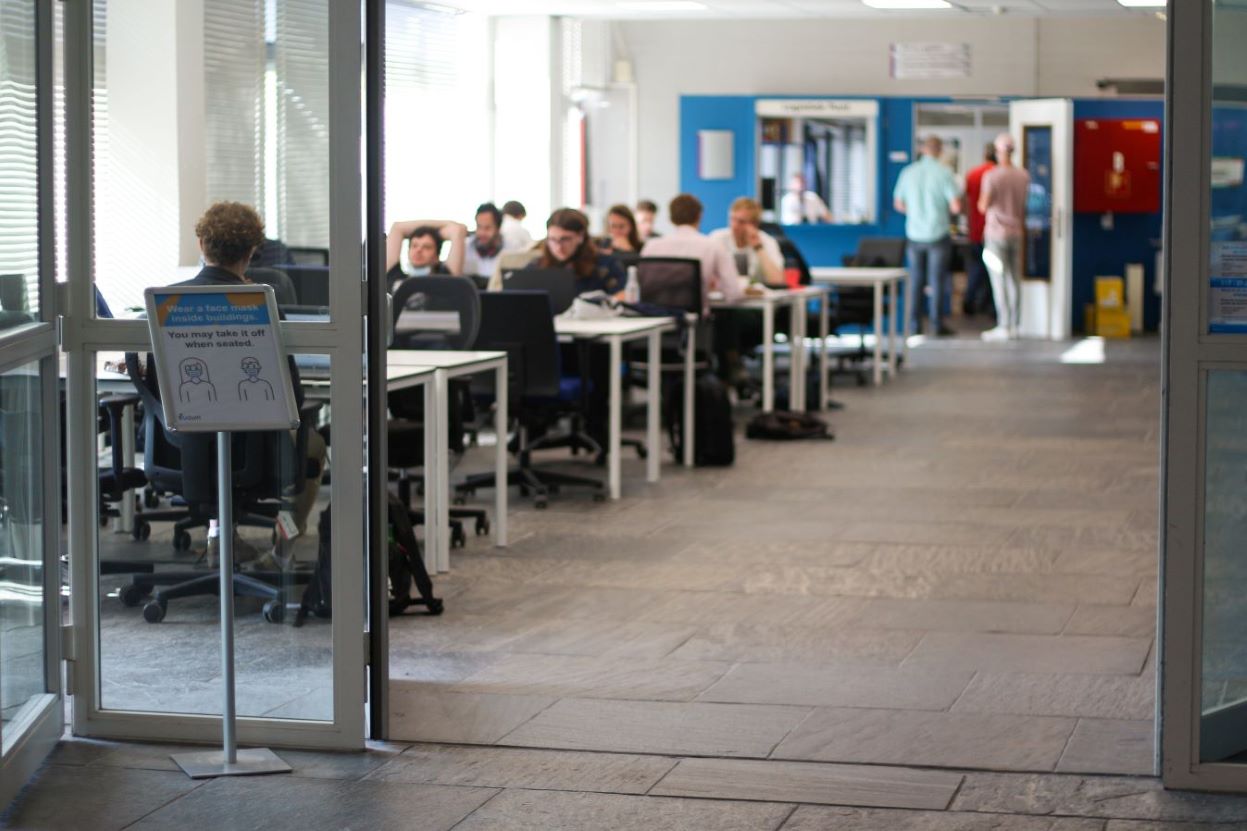While teachers see the sense in a call to ban deadlines between 11 PM and 11 AM, they also place the responsibility at the door of the students. “You need to learn to plan.”
(Photo: Jystina Botor)
Teacher Bas Flipsen sees sense in Van Kouwen’s letter. He too worked through the night as a student. And now that he is combining research and teaching at TU Delft, he too submits assignments at the last minute. “I have a deadline for a conference paper this Saturday. That means that I will be at my computer working on Saturday evening instead of drinking a glass of wine with my wife.” He tries to make sure that his students too have weekends and evenings off. “This means that I do not set deadlines after 6 PM or in the weekend.”
The perfect time does not exist
Maurício Aniche, who won the Faculty of Electrical Engineering, Mathematics and Computer Sciences’ Teacher of the Year 2020/2021, does not believe that there is a perfect time for deadlines. “I have tried all kinds of times over the years. Early in the morning, at 11:59 PM, and in the middle of the day. Even if you set a 5 PM deadline, some students will still work until the early hours the night before.”
He recognises the need and utility of deadlines. “With a small module I once tried to not set any interim deadlines at all. It was a module in which students worked in more than 10 groups on one large project. The outcome was that only one group asked for feedback in the whole quarter. The other groups only asked for feedback at the end of the quarter.”
Van Kouwen’s letter is stirring things up at TU Delft. Students and teachers are voicing their thoughts on Twitter, LinkedIn and Instagram. And Nathan Kramer – master’s student Management in the Built Environment at the Faculty of Architecture and the Built Environment – said in a letter that TU Delft has too many deadlines and that they block creativity. ID teacher Erik Tempelman believes his latter point to be nonsense. “If you let yourself be paralysed by a deadline, you should not do a creative job. The art is to be able to turn creativity on and off at will. You learn this during your degree programme, in part because of handing in assignments.”
Bridging a gap
Adriaan Norbart, educationalist at the joint Clinical Technology bachelor at TU Delft and the Universities of Leiden and Rotterdam, sees teachers struggling with deadlines. “Only this week a Module Coordinator came to me to discuss her module’s deadlines,” he says. “I generally try to assess the feasibility of the deadlines. I look at whether the students can plan the assignment in their schedules or whether they only get the last bit of the information they need a week before the deadline in which case they are forced to work at the last minute. From a didactic point of view, these are important aspects to know. Having to work 44 hours instead of 40 once is doable, but students having to work 60 hour weeks for a long time is not,” he says.
Apart from his work as an educationalist, he also teaches the Medical Education module to medical students. Norbart believes that teachers are constantly trying to bridge a gap. “On the one hand you want to support students in their learning process by not overloading them with deadlines or not setting deadlines at strange times. On the other hand you want students to become independent professionals. You will sometimes have three tight consecutive deadlines or a submission time at a strange time in real life. If you do not make them on time, you will stew in your own juice, as the saying goes. It is important that students learn to plan and they themselves learn to avoid having to work through the night.”
‘You will sometimes have three tight consecutive deadlines in real life’
Like Aniche, he too sees that there is no perfect time for deadlines. “Much scientific research has been done into when people are at their most productive. Almost all the research shows that this varies according to each person.” He sees that each student deals with their submission deadline in their own way. “One works best in the middle of the night and may work through a couple of nights, while the other is most productive in the afternoon and prefers a 5 PM deadline.”
Tension
Deadlines create tension between what works well for students and what works well for teachers, say the teachers. Aniche says that “For students, a deadline at the end of the semester may be good, but at the end of the semester I cannot call on my teaching assistants much as they have deadlines for the modules that they are taking as students. Every year I have to look for the best time to set my deadlines.”
Aniche, Norbart, Tempelman and Flipsen all do their best to avoid their deadlines coming at the same time as those of other modules. They consult other teachers and check with students whether a deadline is doable for them. “They sometimes find it hard to estimate though,” notes Norbart. “They sometimes have no idea and say that they have to see.”
To Aniche, forbidding deadlines at certain times as Van Kouwen suggested is not a good idea. Flipsen and Tempelman too believe that setting rules will not work. “It’s really good that this is up for discussion,” says Tempelman. “Both teachers and students should continue talking about it.”
Do you have a question or comment about this article?
a.m.debruijn@tudelft.nl


Comments are closed.